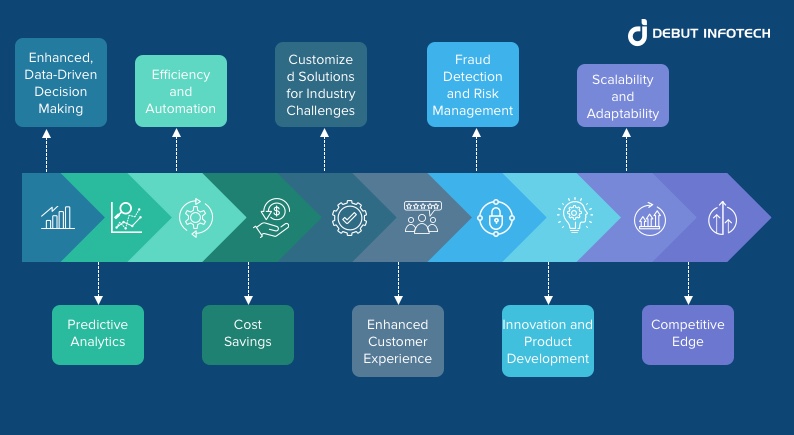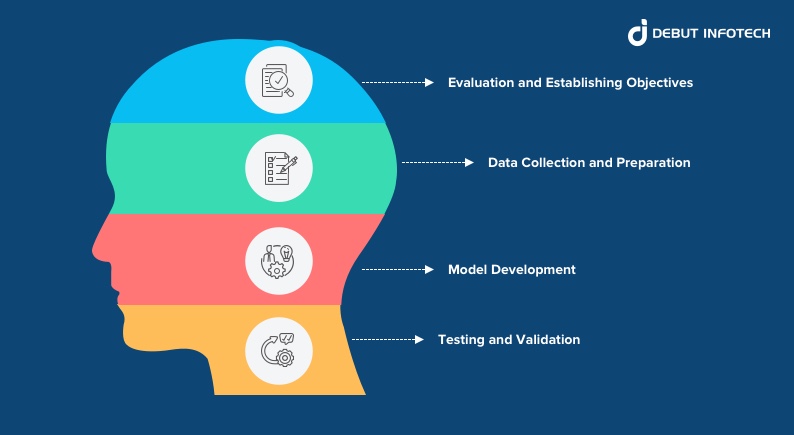
|
Getting your Trinity Audio player ready...
|
The rapid expansion of computational power, the availability of extensive datasets, and breakthroughs in algorithmic advancements are propelling machine learning (ML) projects and trends to unparalleled heights.
As we step into 202, the landscape for ML Consulting is evolving rapidly, driven by advancements in technology, changing market dynamics, and a growing awareness of the impact ML can have on business outcomes. In this comprehensive guide, we’ll explore key trends, challenges, and best practices to navigate the world of ML consulting in 2025.
Understanding the ML Consulting Landscape
Machine learning consulting is a specialized service that helps businesses harness this technology effectively and more productively. It involves collaborating with experts who possess the knowledge and experience needed to leverage machine learning for various applications. The primary goal of machine learning is to help businesses improve their performance and productivity using artificial intelligence. In an environment of rapid change and intense competition, the goal of machine learning is to facilitate businesses to harness its potential for optimum results.
ML is no longer confined to niche applications; it is becoming a mainstream tool for solving complex business challenges. From predictive analytics and natural language processing to image recognition and recommendation systems, the scope of ML applications continues to expand. As a consultant, staying abreast of these diverse applications is crucial to offering tailored solutions to clients.
Industry-specific knowledge is also gaining prominence in ML Consulting. Clients are seeking consultants who understand the nuances of their sector, whether it’s healthcare, finance, retail, or manufacturing. Deep industry knowledge allows consultants to customize ML solutions that align with regulatory requirements, business processes, and specific challenges unique to each vertical.
Let’s understand it with the help of an example; Imagine a retail company looking to improve its sales forecasts. Machine learning consulting can help this business implement predictive models that analyze historical sales data, seasonal trends, and external factors like holidays to provide more accurate forecasts. Consequently, enabling the company to optimize inventory management and boost profits.
Here are some ways in which ML consultants are helping clients achieve their goals:
- Fast and accurate decision-making
- Increase Productivity Efficiency,
- Help in managing the workforce,
- Better services and monitoring,
- Personalize Customer service and experiences.
Trends Shaping ML Consulting in 2025
Explainable AI (XAI)
Explainability is a critical factor in gaining trust and acceptance for ML models. Clients are seeking consultants who can demystify complex ML algorithms and provide transparent insights into decision-making processes. XAI will play a pivotal role in making ML more accessible and understandable for non-technical stakeholders.
Federated Learning
Federated Learning is emerging as a game-changer, especially in industries where data privacy is paramount. This decentralized approach to ML allows models to be trained across distributed devices without exchanging raw data. ML consultants need to explore the potential of Federated Learning and guide clients on its implementation.
AI/ML Ops
The convergence of AI and DevOps, often referred to as AI/ML Ops, is gaining traction. ML consultants should adopt a more holistic approach, integrating ML models into the entire software development lifecycle. This involves collaboration between data scientists, developers, and operations teams to streamline model deployment, monitoring, and maintenance.
AutoML Advancements
Automated Machine Learning (AutoML) tools are becoming more sophisticated, enabling non-experts to build and deploy ML models. While these tools democratize ML to some extent, consultants should guide clients on when to leverage AutoML and when a more customized approach is necessary.
The Difference Between Deep Learning Consulting and ML Consulting?
Deep learning is one of the most effective and well-liked machine learning algorithms currently available. It has several applications, including automated predictions, computer vision, and natural language processing.
The majority of machine learning consultants can assist you in integrating deep learning into your operational procedures. However, because creating deep learning apps presents unique obstacles, seeking advisory services from businesses that specialize in deep learning applications can yield better outcomes.
10 Benefits of Machine Learning Consulting Services for Organizations

Machine Learning (ML) consulting services offer an array of benefits for organizations looking to harness the power of data-driven insights and automation. As the business landscape continues to evolve, the integration of ML consulting can provide a competitive edge and contribute to overall success. Here are key benefits that organizations can derive from engaging in machine learning consulting services:
- Enhanced, Data-Driven Decision Making
One of the paramount advantages that machine learning equips businesses with is the ability to make highly informed decisions. Through machine learning algorithms, organizations gain the capacity to make more informed decisions based on data-driven and nuanced insights. By leveraging sophisticated algorithms, ML models can extract meaningful patterns and trends from large datasets, empowering decision-makers to have a comprehensive understanding of their business landscape. For instance, a marketing department can use predictive analytics to target specific customer segments with personalized campaigns that can result in substantially higher conversion rates and increased ROI (Return On Investments).
- Predictive Analytics
Organizations can gain a strategic advantage by implementing predictive analytics through ML consulting. These services enable the creation of models that forecast future trends, behaviors, and outcomes, allowing businesses to proactively address challenges and seize opportunities.
- Efficiency and Automation
Machine learning is efficacious as it can automate repetitive tasks, such as data entry or customer support inquiries, freeing up human resources for more strategic and core activities. Let’s understand it with the help of a customer service chatbot that can handle routine customer queries with much ease and effortlessness, thus allowing human agents to focus on complex issues leading to improved customer satisfaction. These chatbots are now increasingly being employed almost in every sphere of business for their handiness and efficacy.
- Cost Savings
Machine learning models are hugely prioritized for their cost-effectiveness for they can help businesses identify cost-saving opportunities and revenue-generating strategies. Compared to other traditional approaches, these are much handier and more efficient. For example, a utility company can use predictive maintenance models to minimize downtime of critical equipment that can save substantial maintenance costs, and ensure uninterrupted service to customers.
- Customized Solutions for Industry Challenges
ML consultants bring expertise in tailoring solutions to specific industry challenges. Whether it’s healthcare, finance, manufacturing, or any other sector, machine learning can be customized to address industry-specific issues and optimize processes accordingly.
- Enhanced Customer Experience
ML models can analyze customer data to provide personalized experiences. By understanding individual preferences and behaviors, organizations can offer tailored products, services, and recommendations, thereby enhancing customer satisfaction and loyalty.
- Fraud Detection and Risk Management
Machine learning algorithms are highly effective in detecting anomalies and patterns associated with fraud. ML consulting services can aid organizations in implementing robust fraud detection systems, enhancing overall risk management and security measures.
- Innovation and Product Development
ML consulting contributes to innovation by uncovering insights and opportunities for growth. By analyzing data trends, organizations can identify new product and service offerings, explore novel business models, and stay ahead of market demands.
- Scalability and Adaptability
ML consulting services provide scalable solutions that can adapt to the evolving needs of organizations. Whether a company is experiencing growth or undergoing changes, machine learning can scale seamlessly to accommodate varying demands.
- Competitive Edge
In an increasingly competitive business environment, organizations that harness the power of machine learning gain a distinct advantage. ML consulting services help companies stay ahead of the curve by leveraging cutting-edge technologies and methodologies. The one embracing it earlier will undoubtedly have an edge over those who are late to realize it. So, being an early adopter of machine learning solutions can confer a significant competitive advantage.
ML models can evolve over time based on feedback and new data inputs. ML consulting services include strategies for continuous improvement, ensuring that models remain effective and aligned with changing business dynamics.
Barriers To Machine Learning Adoption
As highlighted, these are the most frequently mentioned barriers according to practitioners:
Talent shortage: According to PwC, there will be more than 2.9 million job postings for data science and analytics roles in the US alone by 2020. Yet, there is not enough data science talent to fulfill this demand.
Limited maturity of ML infrastructure and processes: ML is a new programming paradigm, one that derives rules from data rather than programmer input. It took us tens of years to come up with Scrum, the agile programming approach, currently widely used by most teams. Similarly, it will take time for ML processes and frameworks to reach maturity. TensorFlow, one of the most widely used ML frameworks was only published at the end of 2015.
Most ML techniques are data hungry: Accurately labeled training data is time-consuming and expensive to generate. ML practitioners need to be creative in leveraging public data or get the necessary data labeled.
On the other hand, to label data, businesses can rely on the numerous data labeling companies which have been rising since the 2010s.
Another solution to this is one shot learning and other less data-hungry approaches, however, this is an area of ongoing research.
Deep learning is not explainable. As discussed, this is hindering progress and XAI attempts to address that.
The Machine Learning Consulting Process

The machine learning consulting process is essential because it creates the foundation for a path of transformation. Among the crucial actions in the procedure are the following points:
- Evaluation and Establishing Objectives
The best course of action is to set specific goals. In this sense, consultants collaborate closely with your firm to comprehend your unique requirements and objectives, providing a concrete road map. To increase cross-selling and upselling, for example, an e-commerce business can work to enhance its recommendation engine; the goal-setting process will specify the desired results.
- Data Collection and Preparation
It is indisputable that data is the cornerstone of machine learning. The consultant helps with the data collection, processing, and cleansing. For instance, in the healthcare industry, a consultant such as OakStreet Technologies’ could help a hospital arrange patient records in order to predict illness outbreaks.
- Model Development
Machine learning consultants use the available data to efficiently and expertly build, optimize, and evaluate machine learning models. This is essential to the processing of data. To have a better understanding, consider the following scenario: a manufacturing business that wants to forecast equipment failures. To do so, they can create a predictive maintenance model by utilizing historical maintenance records.
- Testing and Validation
Thorough testing is required before model deployment to adjust for any flaws. To this purpose, consultants run several tests, including A/B and cross-validation, to guarantee the accuracy and dependability of the model. To evaluate the effectiveness of a recommendation algorithm on its website, for example, an e-commerce business could compare it to the prior system through A/B testing.
Real-world Applications of Machine Learning
Machine learning consulting finds applications in various industries, and it would not be an exaggeration to say that it can be used almost in every field of life. Just to mention a few prominent ones, here are some examples that demonstrate its real-world impact:
- Healthcare: Healthcare is transforming thanks to machine learning, which effectively aids in disease diagnosis, medication development, and patient outcome prediction. In more practical terms, medical experts now utilize machine learning algorithms to evaluate MRI and X-ray pictures to diagnose diseases like cancer early on.
- E-commerce: The core of e-commerce platforms is its machine learning-powered recommendation engine. These search engines assist in the analysis of user behavior and preferences to make personalized product and service recommendations that boost client happiness and sales.
- Finance: Machine learning is used by the finance industry for credit risk assessment, algorithmic trading, and fraud detection. Banks, for example, employ machine learning algorithms to identify questionable transactions and stop fraud.
What Is The Future Of Machine Learning Consulting?
ML consulting will grow by tackling the identified issues:
Increasing the talent pool: To find individuals with data science skills, the majority of consultancies are conducting thorough employee analyses. After a short training, a background in arithmetic, statistics, or programming is typically adequate for people to work as data scientists.
Enhancing ML infrastructure and procedures: Better procedures, enhanced computing resources (such as GPUs and AI chips), and increased automation will make machine learning (ML) faster and simpler as it develops as a programming paradigm.
Using data creatively: The abundance of translated official papers in Europe and Canada has allowed advances in Natural Language Processing (NLP). While gathering data is a fairly simple answer, more technological solutions may be found in fields of AI research like transfer learning or data synthesis.
Additionally, improvements in explainable AI are anticipated, which would boost confidence in machine learning systems and facilitate a broader use of them.
Eliminating biases in algorithms: Incomplete training data and developer biases can cause machine learning algorithms to render inaccurate conclusions. Reducing or eliminating these biases can help create more accurate models.
Lastly, by shifting decision-making to edge devices, local machine-learning applications are probably going to make the Internet of Things apps smarter and faster.
Conclusion
ML consultancy will remain a major influence on how companies use data to make strategic decisions as we move forward. The secret to success is to stay committed to responsible and ethical AI, embrace new trends, and deal with obstacles head-on.
ML consultants will be essential in helping businesses navigate the complex world of machine learning in this year and beyond so they can fully realize the benefits of data-driven insights. ML consultants can traverse the changing landscape and contribute to the transformative impact of machine learning across varied industries with a thorough awareness of industry-specific difficulties, a focus on transparency and ethical considerations, and a commitment to continual innovation.
Frequently Asked Questions
Q. What is machine learning consulting?
Machine learning consulting involves partnering with experts who provide strategic guidance, implementation support, and ongoing management for machine learning projects. These consultants help businesses leverage ML algorithms to improve processes, predict outcomes, and gain competitive advantages.
Q. Why is machine learning consulting important for businesses in 2025?
Currently, the rapid advancements in ML technologies mean businesses must stay updated to remain competitive. Machine learning consulting helps organizations integrate cutting-edge solutions, optimize operations, and harness data-driven insights, ensuring they are at the forefront of innovation.
Q. How do I choose the right machine learning development company?
When choosing a machine learning development company, consider their experience, expertise, and track record. Look for consultants with industry-specific knowledge, strong client testimonials, and a proven ability to deliver scalable and effective ML solutions.
Q. What services do machine learning consulting firms typically offer?
Machine learning consulting firms typically offer services such as strategy development, model building, data analysis, system integration, and ongoing support. They may also provide training for your team and help you navigate regulatory and ethical considerations.
Q. How can machine learning consulting benefit my business?
Machine learning consulting can benefit your business by enhancing decision-making, automating processes, and providing predictive insights. This can lead to increased efficiency, reduced costs, and the ability to uncover new opportunities for growth.
Q. What industries can benefit from machine learning consulting?
Machine learning consulting can benefit a wide range of industries, including healthcare, finance, retail, manufacturing, and technology. Any industry that relies on data for decision-making and process optimization can leverage ML to improve outcomes.
Q. What are the key trends in machine learning consulting for 2025?
Key trends in machine learning consulting for 2025 include the increased adoption of automated machine learning (AutoML), the integration of ML with IoT and edge computing, enhanced focus on ethical AI, and the use of ML for real-time data processing and decision-making.


